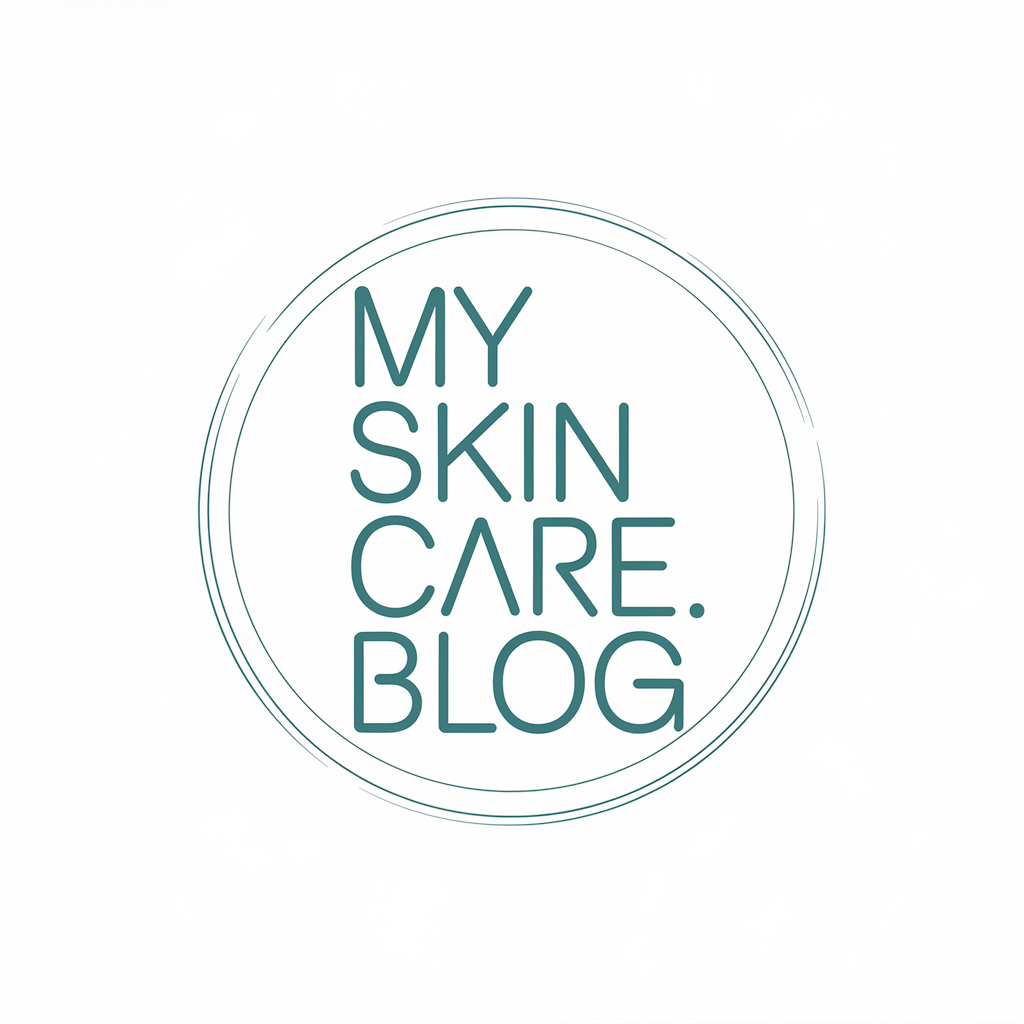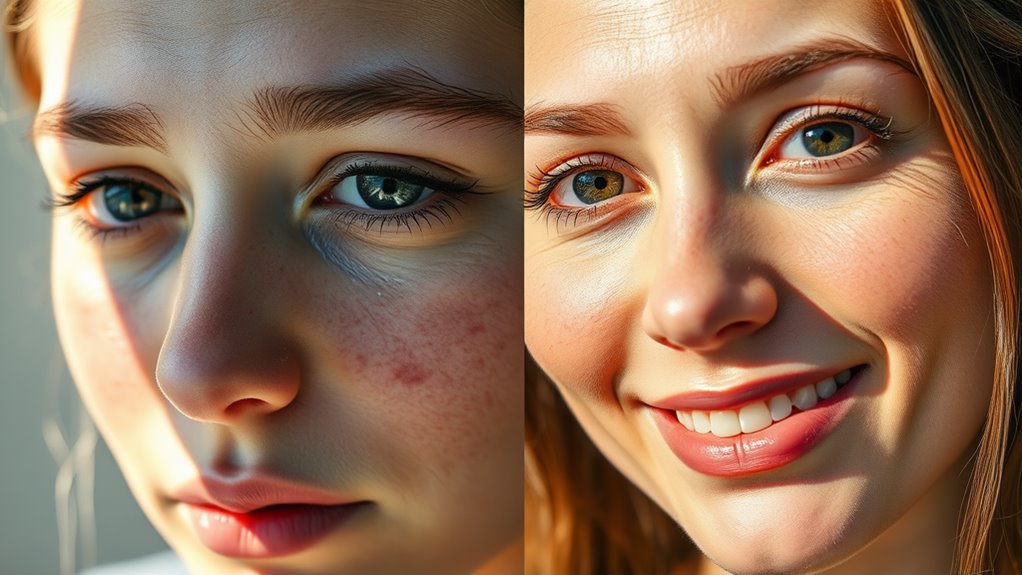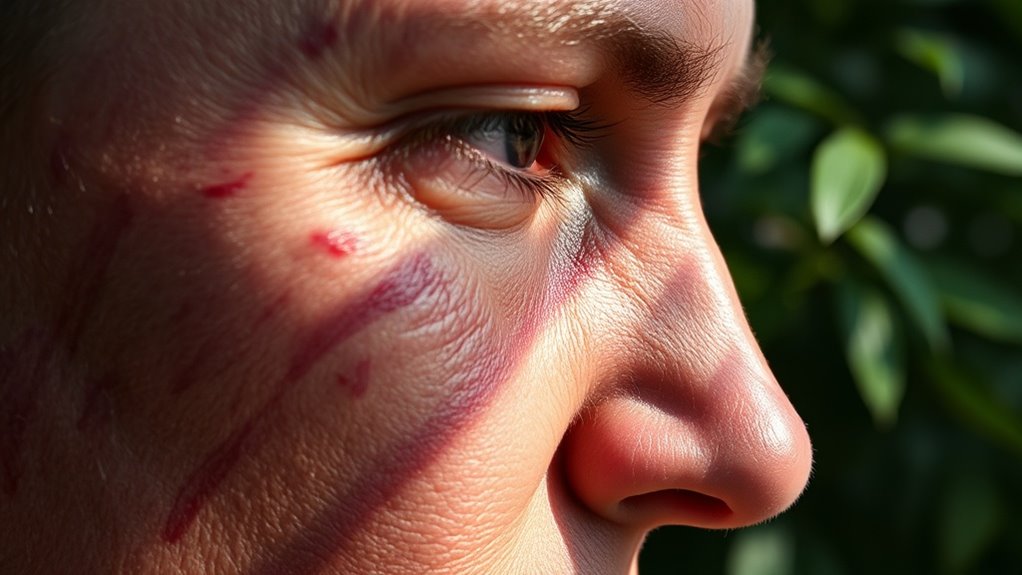Poor Sleep – Bad Skin. These Tricks Help Both!
Poor sleep wreaks havoc on your skin, causing dark circles, wrinkles, and dullness from inflammation and reduced collagen production, as studies confirm. You can turn things around by establishing a consistent bedtime routine, avoiding evening caffeine, and using antioxidant serums to boost repair. Add valerian root for deeper rest, and you’ll notice clearer, radiant skin. Keep exploring these simple strategies for even better results.
Key Takeaways
- Establish a consistent bedtime routine to improve sleep quality and reduce skin inflammation.
- Avoid caffeine after noon to enhance sleep and prevent breakouts.
- Incorporate antioxidant-rich foods to support skin health and promote restorative sleep.
- Use relaxation techniques like meditation to lower stress, aiding better sleep and clearer skin.
- Apply evening skincare routines to hydrate skin and prepare for deeper, restorative sleep.
The Impact of Poor Sleep on Skin
When you skimp on sleep, your skin pays the price, as research shows it accelerates aging and triggers inflammation.
Additionally, sleep deprivation often results in dark circles that make the eyes appear tired and puffy.
Poor sleep disrupts collagen production, causing fine lines and wrinkles to emerge faster, while increasing oxidative stress that dulls your skin’s natural glow.
Evidence from dermatological studies confirms that consistent rest enhances cellular repair, helping you maintain a radiant complexion.
Don’t underestimate sleep’s role; it’s crucial for reducing puffiness and promoting even tone, ensuring your skin looks vibrant and healthy despite daily stressors.
Prioritize it to preserve that essential glow.
Moreover, delving into the biological relationship between sleep quality and skin health offers valuable insights for optimizing your overall well-being.
Understanding Sleep Deprivation Effects
Sleep deprivation wreaks havoc on your body and mind, with research from sources like the American Academy of Sleep Medicine highlighting its role in impairing cognitive function, weakening immunity, and exacerbating chronic conditions.
You experience heightened stress hormones, such as cortisol, which inflame your skin, promote breakouts, and accelerate aging, as evidenced by studies in the Journal of Clinical Sleep Medicine.
It also hampers cellular repair, leaving you with a dull complexion and increased vulnerability to illnesses.
Backed by neuroscience, these effects underscore sleep’s critical role in maintaining overall health and resilience.
Simple Strategies for Better Sleep
You can improve your sleep by adopting effective bedtime routines, tweaking your sleep environment, and using proven relaxation techniques.
Studies confirm that these strategies reduce insomnia and boost overall health, making them essential for countering sleep deprivation’s effects.
Now, we’ll examine how you implement them to see real benefits.
Bedtime Routines
Establishing a solid bedtime routine transforms your sleep patterns, drawing from research on circadian rhythms. You maintain a consistent schedule, going to bed and waking at the same time daily, which aligns your body’s internal clock per sleep studies.
Engage in relaxing activities like reading or meditation; evidence shows these lower stress hormones and boost sleep quality. Avoid caffeine and heavy meals in the evening, as research links them to disrupted melatonin production.
Track your routine’s impact, noting how improved rest enhances skin repair and overall health, based on clinical findings.
Sleep Environment Tips
Creating an optimal sleep environment can dramatically enhance your rest, as studies show that factors like room temperature and lighting directly influence your circadian rhythms.
Aim for a cool room temperature of 60-67°F, as research from the Sleep Research Society confirms this promotes deeper sleep stages.
Use blackout curtains to block light, boosting melatonin production and aligning your body’s clock.
Invest in a supportive mattress and pillows to minimize discomfort and night-time awakenings.
Control noise with a white noise machine, as evidence from the National Sleep Foundation links quieter environments to better REM sleep, ultimately supporting healthier skin through improved recovery.
Relaxation Techniques
While daily stresses often disrupt sleep, effective relaxation techniques provide straightforward ways to unwind and improve rest. You can incorporate these into your nightly routine to reduce anxiety and enhance sleep quality, backed by research from the National Sleep Foundation.
| Technique | How to Practice | Evidence-Based Benefits |
|---|---|---|
| Deep Breathing | Inhale for 4 counts, exhale slowly | Lowers cortisol, per Harvard studies |
| Progressive Relaxation | Tense and release muscle groups | Speeds sleep onset, as per APA research |
| Guided Imagery | Visualize calming scenes | Reduces insomnia symptoms, evidenced by NIH trials |
| Meditation | Focus on breath for 10 minutes | Improves REM sleep, supported by meta-analyses |
| Body Scan | Scan from toes to head mentally | Enhances overall rest, per sleep journals |
Daily Routines to Improve Skin Health
You can transform your skin by starting with a morning skincare routine that includes cleansing and SPF application, as studies confirm this shields against UV damage and reduces aging signs. For enhanced protection, consider choosing SPF 50 for its superior defense against UVB rays compared to lower options.
Then, build evening hydration habits like using serums and moisturizers to lock in moisture, which experts link to improved barrier function and fewer breakouts.
These routines, supported by dermatological evidence, help you maintain radiant skin daily.
Moreover, incorporating daily sunscreen is essential as it prevents premature aging by blocking harmful UV rays, making it a key anti-aging strategy.
Morning Skincare Routine
A morning skincare routine sets the foundation for healthy skin by gently cleansing and protecting it from daily environmental stressors.
You begin by using a mild, pH-balanced cleanser to remove impurities, as dermatological studies show this reduces inflammation and prevents breakouts.
Pat your skin dry, then apply an antioxidant serum like vitamin C; research from the Journal of Cosmetic Dermatology confirms it neutralizes free radicals.
Follow with a lightweight moisturizer to strengthen your skin’s barrier, supported by evidence linking hydration to improved elasticity.
End with broad-spectrum SPF 30+ sunscreen, as the FDA recommends, to shield against UV damage and premature aging.
Evening Hydration Habits
Evening hydration habits play a key role in restoring your skin’s moisture barrier after a day’s exposure to pollutants and stress.
Start by drinking at least two glasses of water before bed to replenish fluids, as studies show this reduces inflammation and supports cellular repair.
Apply a hyaluronic acid serum followed by a ceramide-rich moisturizer; research confirms these boost hydration levels and strengthen the barrier.
Use a humidifier to maintain room humidity, preventing transepidermal water loss.
Avoid caffeine and hot showers, which dehydrate you.
These evidence-based routines improve sleep and minimize breakouts for healthier skin.
Natural Tips for Restful Nights
While modern lifestyles often disrupt sleep patterns, incorporating natural strategies can significantly enhance your rest and overall well-being, as backed by studies on herbal remedies and routines.
For instance, you can brew chamomile tea nightly, as research shows it reduces anxiety and promotes deeper sleep. Establish a consistent bedtime routine, like reading or gentle stretching, which studies link to improved sleep quality.
You should also limit screen time an hour before bed, supported by evidence that blue light suppression boosts melatonin. Aim for morning sunlight exposure, as it regulates your circadian rhythm, per sleep science findings.
Finally, try valerian root supplements, proven in trials to shorten sleep onset. These evidence-based tips help you reclaim restful nights. Additionally, quality sleep can help mitigate the hormonal changes triggered by stress, supporting clearer skin.
Moreover, enhancing your sleep with these methods can help mitigate stress-related skin issues, contributing to a clearer complexion overnight.
Achieving Radiant Skin Through Quality Rest
Quality rest transforms your skin, boosting its radiance and resilience as your body repairs itself overnight.
Evidence from sleep studies, like those in the Journal of Investigative Dermatology, shows that deep sleep increases collagen production and reduces inflammation, combating wrinkles and dullness.
You accelerate this by prioritizing 7-9 hours of uninterrupted rest, which lowers cortisol levels and enhances cell regeneration.
Maintain a consistent schedule, avoid caffeine late in the day, and create a dark sleep environment. Additionally, incorporating nutrient-rich foods into your diet can enhance collagen production and protect against free radicals for better skin elasticity.
These habits, backed by clinical research, help you achieve a clearer, more youthful glow effortlessly.
Moreover, incorporating dietary choices rich in antioxidants can further boost collagen production and support skin health for a more radiant appearance.





